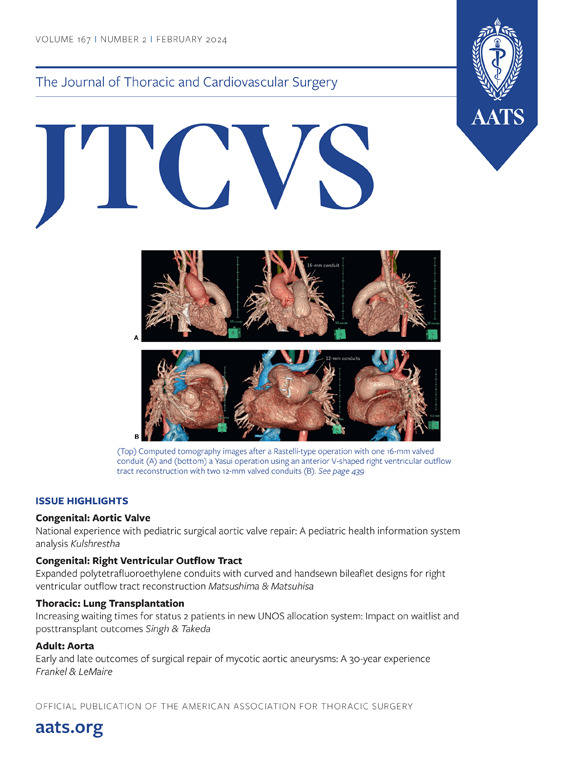肺癌临床试验参与中的性别、种族和民族:2002-2021年253,845名患者的分析。
IF 4.9
1区 医学
Q1 CARDIAC & CARDIOVASCULAR SYSTEMS
Journal of Thoracic and Cardiovascular Surgery
Pub Date : 2024-09-29
DOI:10.1016/j.jtcvs.2024.09.040
引用次数: 0
摘要
目的:肺癌仍然是癌症相关死亡的最大原因,多项大型研究发现肺癌结果中持续存在种族差异。在本研究中,我们利用临床试验网(clinicaltrials.gov)上公开记录的肺癌数据,对肺癌临床试验参与者的年龄、性别、种族和民族特征进行抽样调查:我们在 Clinicaltrials.gov 这个美国联邦政府的临床试验资料库中查询了 "肺癌 "和其他几个相关术语。我们生成了一份符合这些标准的所有研究清单,并对参与者的年龄、性别、民族和种族分类信息进行了分析。未向 clinicaltrials.gov 报告结果或至少有一个研究地点不在美国的研究被排除在外。假设检验采用学生 T 检验和卡方检验。用 Python(VS Code,Microsoft,Redmond,WA 2023)中的斯皮尔曼检验对趋势进行了分析。 结果:少数族裔(非白人)和女性参与美国肺癌临床试验的比率有了显著增加(p结论:我们的数据表明,肺癌临床试验中的种族和民族差异持续存在,但在不断改善。本研究的局限性包括clinicaltrials.gov上的结果报告较少。这些研究结果表明,在招募少数族裔参与方面取得了重大进展,但同时也指出了政策改革的重要作用,即根据肺癌发病率调整参与情况。本文章由计算机程序翻译,如有差异,请以英文原文为准。
Gender, race, and ethnicity in lung cancer clinical trial participation: Analysis of 253,845 patients from 2002 to 2021
Background
Lung cancer remains the greatest cause of cancer-related death, and multiple large studies have identified persistent racial disparities in lung cancer outcomes. In this study, we used public recording of lung cancer data on clinicaltrials.gov to sample age, gender, racial, and ethnic characteristics of participants in lung cancer clinical trials.
Methods
ClinicalTrials.gov, a US federal government repository of clinical trials, was queried for the term “lung cancer” and several related terms. A list of all studies matching these criteria was generated, and information regarding age, gender, ethnicity, and racial breakdown of participants was analyzed. Studies that did not report results to ClinicalTrials.gov or had at least one non-US site were excluded. Hypothesis testing was performed with the Student t test and χ2 test. Trends were analyzed using Spearman testing in Python (VSCode).
Results
Rates of minority (ie, nonwhite) and female participation in US lung cancer clinical trials have increased significantly (P < .01) over the 20-year period from 2002 to 2021 but still do not represent parity with lung cancer incidence. Subset analysis by intervention offered did not show any significant differences in race, gender, or ethnic participation between studies that offered surgical intervention and those involving noninvasive interventions. National Institutes of Health–funded studies do not appear to have recruited any Hispanic participants, as assessed by reporting on ClinicalTrials.gov. The rates of race and ethnicity reporting also increased significantly over the study period.
Conclusions
Our data demonstrate that there are persistent but improving racial and ethnic disparities in lung cancer clinical trials. Limitations of this study include poor reporting of results on clinicaltrials.gov. These findings demonstrate significant progress in the recruitment of minority participation, but also identify a significant role for policy changes to align participation with lung cancer incidence.
求助全文
通过发布文献求助,成功后即可免费获取论文全文。
去求助
来源期刊
CiteScore
11.20
自引率
10.00%
发文量
1079
审稿时长
68 days
期刊介绍:
The Journal of Thoracic and Cardiovascular Surgery presents original, peer-reviewed articles on diseases of the heart, great vessels, lungs and thorax with emphasis on surgical interventions. An official publication of The American Association for Thoracic Surgery and The Western Thoracic Surgical Association, the Journal focuses on techniques and developments in acquired cardiac surgery, congenital cardiac repair, thoracic procedures, heart and lung transplantation, mechanical circulatory support and other procedures.

 求助内容:
求助内容: 应助结果提醒方式:
应助结果提醒方式:


